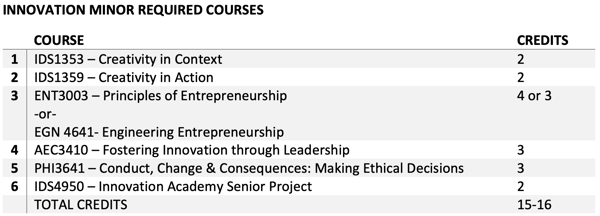Published on
Maximizing Resources and Supporting Employability: How UF is Innovating the Academic Calendar

According to the National Association of Colleges and Employers (NACE), college graduates need problem solving skills and the ability to work effectively in teams, (Gray, K., Koncz, A. 2017).
At the University of Florida (UF), the Innovation Academy (IA) program is providing university students with these skills alongside more access, richer learning opportunities, and innovation-learning experiences. The UF Innovation Academy enrolls students in an Innovation minor program that envelopes student’s entire undergraduate experience on a spring/summer academic calendar.
The Innovation minor allows targeted focus on developing the fundamental skills of innovation, like creativity, entrepreneurship, leadership, ethics and communication (Eich, D.E. 2018).
IA, now in its seventh year, began as an idea to meet several university goals. First, as the flagship university in the state, UF has fully maximized its campus resources during the fall semester by enrolling approximately 6,500 new undergraduate students in its traditional campus program each year. However, pressure is high from state legislature, alumni, parents, and students to grow undergraduate enrollment while maintaining the high quality of the undergraduate experience.
The impetus for IA, therefore, was to increase enrollment of undergraduate students and utilize resources during the entire academic year.
At UF, top administrators and academic deans considered these issues and envisioned a spring/summer enrollment model. The model enhanced the ability to utilize campus resources during times of lower enrollment. UF graduates approximately 2,000 students each fall semester, consequently creating enrollment capacity in the student body during the spring and summer semesters, before new undergraduates arrive in fall. Additionally, the summer semesters at UF generally enrolls at reduced capacity, again providing room and available resources for students to use.
Second, UF was seeking to capitalize on the synergy of the 40-acre work/live/play environment of the newly constructed Innovation Square. Innovation Square is an urban research park complete with high-tech businesses, UF based start-ups, and a student resident hall complete with maker space that is two blocks from campus.
When these constraints, goals, resources and ideas were combined, the output was UF’s Innovation Academy.
UF’s Innovation Academy Program
The Innovation Academy currently defines its minor program as “a multidisciplinary undergraduate program that infuses an innovation minor focused on providing students with experience and skills for the 21st century.”
The outcome skills include design thinking, teamwork, problem solving, communication, ethics, leadership, creativity, pitching ideas and the entrepreneurial mindset. The program is built upon of five distinct parts:
Part 1: The Innovation Minor
The Innovation minor is comprised of six courses (15-16 semester credits) designed to provide a core knowledge base and a skill set to prepare IA students for the 21st-century economy. The minor is exclusive to students in the program, with three of the courses developed and delivered in the Innovation Academy. The three remaining courses are taught and delivered by participating colleges across the campus.
Students take one innovation class a semester along with their respective major coursework. Each participating major has already included the six courses within their degree requirements so no additional credits are necessary to graduate. Students graduate with both their college major and this exclusive Innovation minor.
Part 2: Co-Curricular Experiences
The co-curricular experiences surround the academic portion of the program through a variety of opportunities, which help students practice the learning outcomes of the curriculum. Examples of the co-curricular experiences include design competitions, study abroad trips, student leadership organizations, internships and volunteering.
Part 3: Fall Connection
Given that this academic calendar enrolls students in the spring/summer semesters, students also want opportunities to engage within the university during their first pre-matriculated fall semester, without negatively influencing the traditional academic calendar. The fall connection opportunities include local and global internship opportunities, online course work, IA study abroad, undergraduate research, and experiential activities such as shadowing or volunteering.
Part 4: Operating on Campus During Spring and Summer
After indicating their interest in IA on the UF admission application, and being accepted, students are enrolled each spring and summer semester for all four years of their undergraduate degree program. This model allows majors that can offer every required course and still have room to add the Innovation minor courses.
To participate, each dean reviews and selects programs that they can ensure will have course delivery in the spring/summer calendar. For UF, this has included the larger colleges and highly enrolled majors where many course opportunities in the summer already exist. However, even with these majors and others in the program, coordination between the IA and the respective colleges is paramount to be able to deliver all required courses for each degree program. This is especially significant when developing the schedule for the summer Innovation minor courses and the large gateway courses (Chemistry, Calculus, Biology, etc.) that multiple majors across campus require students to complete.
Additionally, active collaboration with housing, the registrar, financial aid, business services and student affairs offices is necessary to adapt to this new enrollment model. IA students also have access to IA academic advisors and program coordinators who assist with coordination and professional development from semester to semester.
Part 5: Available Majors
Currently, 30 majors are available in the spring/summer enrollment model. These include majors from the College of Agricultural & Life Sciences, Business, Design, Construction and Planning, Engineering, the Arts, Journalism & Communications and Liberal Arts & Sciences.
This culmination of multiple disciplines is one of the advantages of the program because it allows students to work on course projects with students from various majors, which models real-world working environments.
Creating New Pathways for New Student Demographics
UF IA is one of the nation’s forward-thinking undergraduate programs at one of its most dynamic research universities. The vision of a successful spring/summer enrollment model has achieved UF’s goals—to enroll more students, provide more access, leverage the university resources and integrate innovation education in the undergraduate experience.
Since its inception, the IA has admitted 5,303 students and enrolled 1,967 of those students, during the period where the freshman class of 2020 is still confirming their enrollment. Current enrollment stands at 1,151, and the program produces 50-70 prototypes annually, sends 15-20 students on study abroad trips every fall, enrolls 25 students in the local internship program, and graduates approximately 115 students with the Innovation minor each year.
IA continues to maintain its enrollment pattern and goal of providing motivated students a small-college experience focused on preparing them for the 21-century workplace with the skills necessary to succeed.
– – – –
References
Gray, K., Koncz, A. (2017, November, 30). The Key Attributes Employers Seek on Students’ Resumes. Retrieved from https://www.naceweb.org/about-us/press/2017/the-key-attributes-employers-seek-on-students-resumes/
Eich, D.E. (2018). Innovation Skills for the Future: Insights from Research Reports. Retrieved from https://www.innovationtraining.org/innovation-skills-for-the-future/




